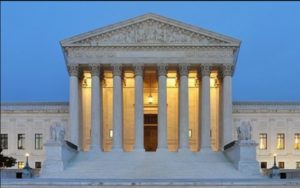 U.S. Supreme Court Case Could Drastically Alter Charter School Movement
U.S. Supreme Court Case Could Drastically Alter Charter School Movement
Last Wednesday, April 30, the U.S. Supreme Court heard oral arguments in a case that could overturn a foundational principle of the charter school movement. In Oklahoma Statewide Charter School Board v. Drummond, the Court could rule on whether charter schools are public schools as established under state laws and strenuously emphasized for decades by charter supporters, or are private actors for purposes of legal safeguards that apply to public schools, including the U.S. Constitution. At issue is whether the Constitution forbids, requires, or allows a sectarian charter school proposed in Oklahoma. See this background from the National Network for District Authorizing (NN4DA).
The recording of the U.S. Supreme Court arguments is available here from the Court. According to this account of the arguments from SCOTUSblog, with the recusal of Justice Amy Coney Barrett, Chief Justice John Roberts’s position appears likely to determine whether the Court splits 5-3 in favor of the proposed Catholic online school or 4-4, leaving in place the Oklahoma Supreme Court decision won by that state’s Republican attorney general that the school is a public school under state law and subject to constitutional provisions. The charter application invalidated by that court stipulates that the school will comply with state and federal education laws applicable to Oklahoma charter schools, including those on serving students with disabilities, “to the extent” that this does not compromise the religious tenets of the school and “to the extent required” in light of constitutional and statutory law governing religious institutions. The application designates educators, administrators, and coaches as ministers, and the school’s employee handbook stipulates that the school will observe local, federal, and state employment laws, including those governing fair employment practices, that are “not inconsistent with the faith or moral teaching of the Catholic Church.”
CCAP and NN4DA were among a group of authorizer organizations that joined an amicus curiae brief, available at the button below, that was submitted to the Court by the National Association of Charter School Authorizers (NACSA). All of the many briefs filed in the case, and additional coverage, can be accessed on the SCOTUSblog page on the case. The authorizers’ brief argues that:
- Charter schools are public schools entwined with state actors;
- Public school chartering necessarily involves ongoing entwinement between charter operators, authorizers, and the state;
- Public school chartering of religious charter schools would obligate authorizers to engage in evaluation, consideration, and approval of religious doctrine; and
- States do not violate the Free Exercise Clause by choosing to provide a secular education in their public schools.
California Attorney General Rob Bonta joined another brief by 18 state attorneys general urging the Court to uphold the Oklahoma Supreme Court.
A plenary panel at CCAP’s California Charter Authorizers Conference next month will discuss the national landscape and outlook for charter school authorizing, including this issue and its potential implications for charter schools and authorizers — even in a state like California.
